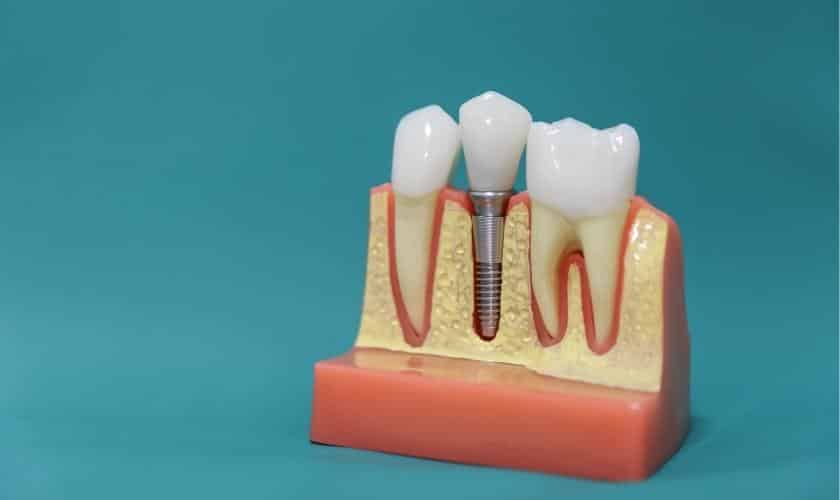Enhance Your Oral Health With Dental Implants in Fort Worth
By :
Affordable Dentist | October 16, 2023
How Dental Implants in Fort Worth Can Improve Your Oral Health
Are you fed up hiding your grin due to missing teeth? Do you wish you could eat, speak, and laugh without worrying about gaps in your mouth? Look no further - dental implants can alter your oral health and restore your full smile! This blog post will examine how dental implants may improve your oral health in Fort Worth. We have all the information you need, from the benefits they provide to receiving them and keeping proper dental hygiene after that. So sit back, relax, and prepare to be amazed by the fascinating world of dental implants!
Dental Implants' Advantages In Oral Health
Dental implants are a cutting-edge method for replacing lost teeth and enhancing oral health. Unlike traditional dentures or bridges, dental implants have various advantages that can considerably improve oral health.
- Dental implants offer stability and support to adjacent teeth, preventing tooth loss, bite problems, difficulty chewing, and jaw pain by preventing misaligned teeth and maintaining proper mouth alignment.
- Dental implants preserve jaw bone density by acting as artificial tooth roots, preventing tooth loss and maintaining facial structure, ensuring long-term oral health.
- When opposed to removable dentures, dental implants work like natural teeth, allowing for effortless eating and speaking while reducing discomfort and constraints.
- Dental implants offer functional and aesthetic benefits, blending seamlessly with existing teeth for a natural appearance, enhancing overall smile confidence and appearance.
Beyond just repairing gaps in your mouth, choosing dental implants for missing teeth promotes oral health by conserving bone density, keeping the appropriate alignment of surrounding teeth, permitting normal speaking and eating capabilities, and boosting overall looks!
The Process Of Getting Dental Implants In Fort Worth
Getting dental implants in Fort Worth entails numerous critical measures for a good and long-term outcome.
- An initial visit with your dentist will establish whether you are a candidate for dental implants, which may include x-rays or 3D scans to check the quality of your teeth and jawbone.
- Following approval for the operation, the next stage is to prepare your mouth for implant placement, which may need the extraction of broken or decaying teeth.
- Once your mouth is ready, titanium implant posts will be surgically implanted into your jawbone. These pegs serve as prosthetic tooth roots, providing a solid basis for the replacement teeth.
- Following implant placement surgery, osseointegration occurs, where bone fuses with implants, creating a strong bond that mimics natural tooth roots.
- After osseointegration, abutments are attached to implant posts, connecting implants to replacement teeth or prosthetic devices, ensuring functional and aesthetically pleasing replacement teeth.
Dental implants in Fort Worth require personalized care from an experienced dentist, as each patient's journey varies based on their specific needs and oral health condition.
How To Choose The Right Dentist For Your Dental Implants Procedure
Choosing the appropriate doctor is critical for receiving dental implants in Fort Worth. Finding a trained and experienced practitioner who can give top-quality care is critical to your oral health and the success of your surgery.
- Research Fort Worth dentists specializing in dental implant procedures, checking their qualifications, experience, and patient reviews to gauge their expertise and reputation.
- Consider the dentist's use of advanced technology and techniques for improved accuracy and outcomes in dental implant surgery, ensuring they stay updated with the latest advancements in implant dentistry.
- Choosing a dentist who ensures comfort and ease during dental implant procedures, especially with multiple visits, is crucial for maintaining good rapport.
- Consider cost factors like insurance coverage and payment plans when choosing a dentist, as finding a dentist within your budget is crucial for many individuals.
By considering these considerations when selecting a dentist for your dental implants in Fort Worth treatment, you can guarantee that you receive high-quality care from beginning to end.
Maintaining Good Oral Health After Getting Dental Implants
After receiving dental implants, it is critical to maintain good oral health. Dental implants are a long-lasting and robust option for missing teeth. It requires adequate maintenance to maintain its lifespan.
- Brushing and flossing on a regular basis are critical for maintaining oral health, eliminating plaque and germs, and avoiding gum disease by removing plaque accumulation between teeth.
- Regular dental visits are crucial for maintaining dental implants, addressing issues, providing guidance on home care, and maintaining proper oral hygiene practices.
- Maintaining healthy habits like avoiding smoking and excessive alcohol consumption can prevent gum disease and hinder healing after dental implants, affecting both natural teeth and implants.
- Maintain a healthy diet, avoiding hard or sticky foods that could damage or dislodge your dental implant, and gradually reintroduce harder foods as directed by your dentist.
Dental implants are a cutting-edge treatment for replacing lost teeth, improving oral health, and reducing bone loss. They also improve oral hygiene by eliminating spaces where food particles might gather. Choose a dentist who specializes in the process to provide the best outcomes.It is vital to maintain good oral health, which includes brushing, flossing, and cleaning around the implant site on a regular basis. Regular dental check-ups are essential to monitor the condition of the implant. Regular dental check-ups are required to monitor implant condition. Dental implants, with proper maintenance, can deliver a natural-looking smile for a lifetime.


